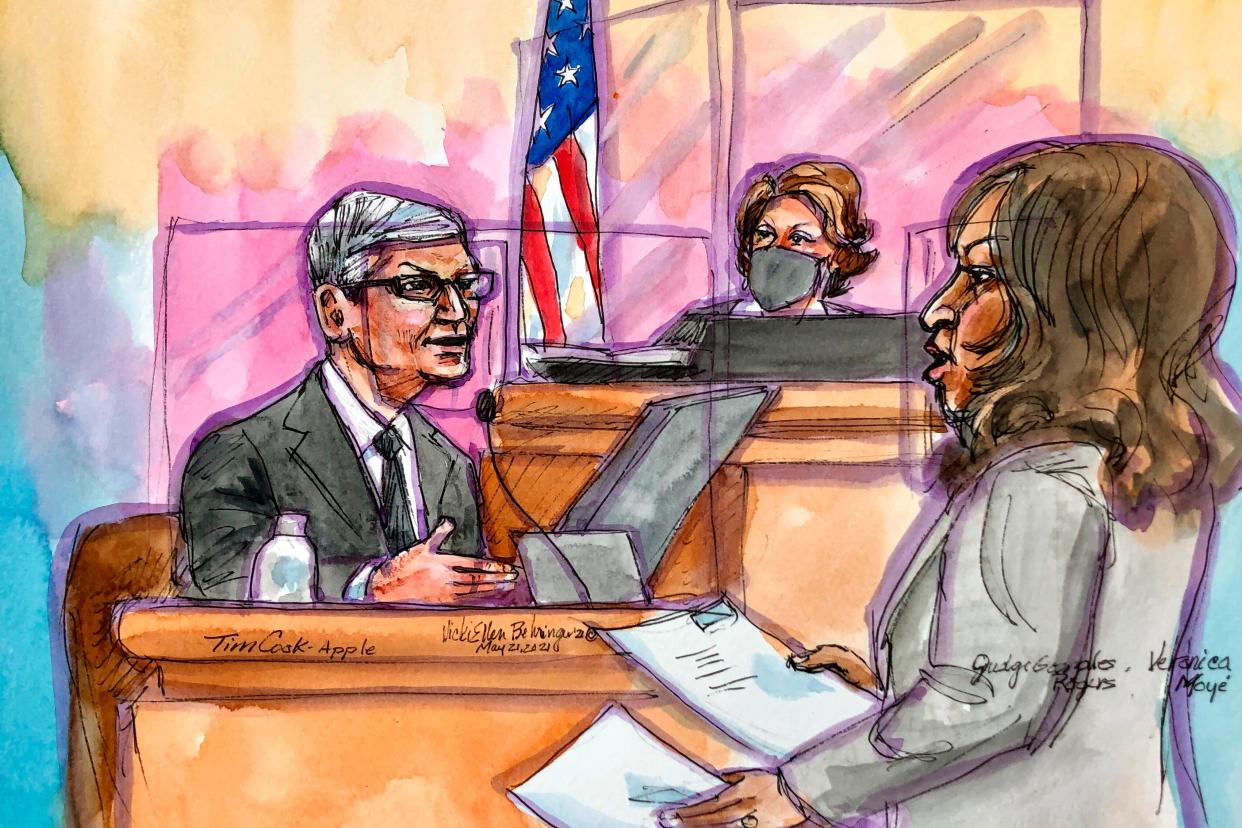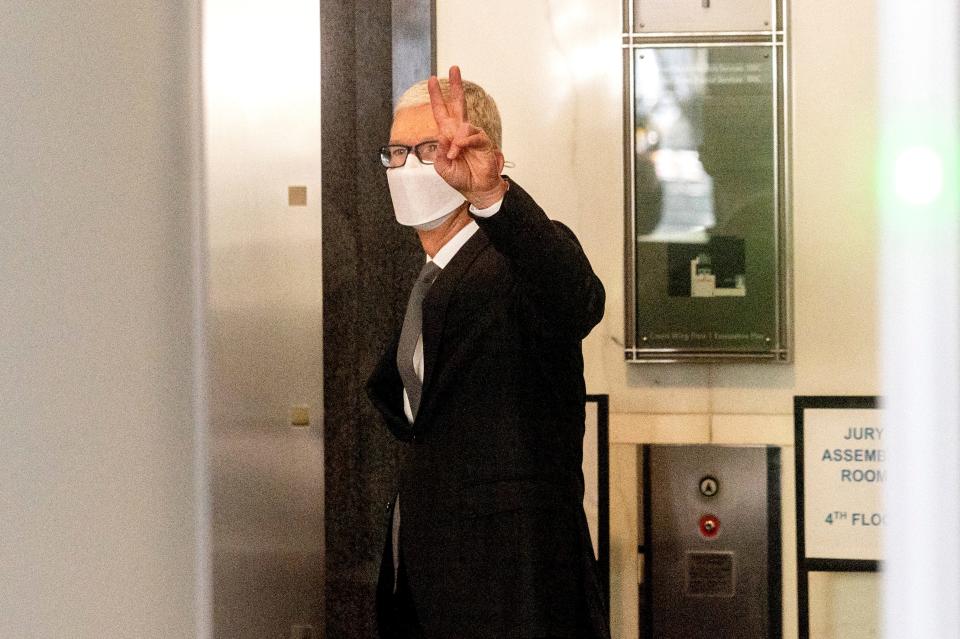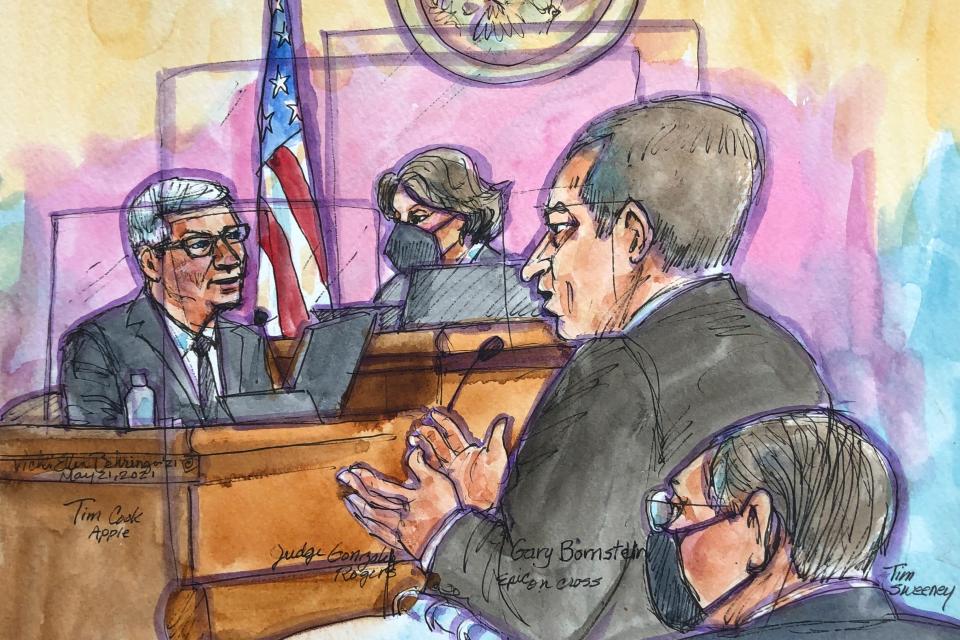Apple v. Epic Games trial: iOS App Store would be 'toxic' mess without review process, Tim Cook testifies

- Oops!Something went wrong.Please try again later.
For about four hours, Apple CEO Tim Cook testified Friday in the trial initiated by Epic Games' suit charging that the tech giant's App Store is monopolistic.
Throughout, Cook provided answers about Apple's business strategy and how the App Store operates. Apple's mission, Cook said, "is to make the best products in the world that really enrich people's lives."
He faced pointed questions from not only Epic Games' attorney Gary Bronstein but also U.S. District Judge Yvonne Gonzalez Rogers. Near the end of Cook's testimony, Rogers asked Cook about games on the App Store and how they provide a disproportionate segment of its revenue.
What would be wrong with giving users more ways to get cheaper content, Rogers asked. The App Store is "quite lucrative ... and focused on purchases that are being made, frankly, on an impulse basis," she said.
Cook noted gamers have chosen the platform and that they have other choices including Android smartphones and game consoles such as the Sony PlayStation, Microsoft Xbox or Nintendo Switch.
Rogers questioned whether there was true competition because of Apple's use of in-app purchases, for which the company gets a commission of 15% or 30%.
Apple had reduced commissions for smaller developers, those earning less than $1 million annually, Cook said. But Rogers asked whether that action might have come because Apple faces investigations from regulatory investigations and lawsuits.
Cook said Apple wanted to do something to help small businesses because of the COVID-19 pandemic, but also "of course we had lawsuits and all the rest of the stuff in the back of our head," Cook said.
"But your action wasn't the result of competition," Rogers said.
Apple v. Epic Games: The trial so far
An Epic showdown:: 'Fortnite' publisher vs. Apple, Google and what it means for you

Apple's App Store: A monopoly?
Epic Games attorneys have sought to drive home the financial boon the App Store represents, suggesting it is a market Apple monopolizes. That “walled garden" for iPhone and iPad apps, Epic charges, has morphed into a price-gouging vehicle that not only reaps a 15% to 30% commission from in-app transactions, but blocks apps from offering other payment alternatives – such as just showing a link that would open a web page offering commission-free ways to pay for in-game items and subscriptions.
Created by Apple co-founder Steve Jobs a year after the iPhone's 2007 debut, the App Store has become a key revenue source for Apple, a money-making machine that helped power the company to a $57 billion profit in its last fiscal year.
But does it violate antitrust laws? Before Cook took the stand, Rogers signaled to attorneys the significance of that issue and how they should address it in closing arguments, scheduled to begin Monday.
Since Apple owns the App Store, "of course they have a monopoly. It's theirs," Rogers said. "The question is whether I accept that argument or not."
Apple's stance has been to focus on its expenditures – more than $100 billion, the company says – to build and maintain the App Store as a dependable destination for developers and consumers. The commissions represent Apple's return on investment, the company's executives have testified.
Earlier during Friday's court action, Rogers asked Cook about malware and data Apple's attorneys wanted him to address. Cook said he believed the data showed about 1% to 2% of malware hits iPhones, compared to 30% to 40% for both Android and Windows mobile operating systems. "It's quite a difference," he said.
In response to a question from Apple's attorney Veronica Moyé about third parties reviewing apps, Cook said, "I think they are not as motivated as Apple is. For us, the customer is everything. We are trying to give the customer an integrated solution of hardware, software and services and deliver ... privacy security and safety. I just don't think you replicate that in a third party."

Apple CEO Tim Cook on the stand
It was Cook's first time to testify in a trial, he told Bornstein, who didn't take it easy on the CEO. Though Bronstein did quip, "I have an iPhone. I hope it still works after my cross-X today."
With 1.8 million apps in the App Store, how can Cook claim the store is well-curated, in terms of having only the best, Bornstein asked. "It's not a good description of something that is curated," he said.
"I disagree," Cook responded.
Prior to that, when asked to describe the App Store's influence, Cook said, "I think it's an economic miracle." The store initially started with just 500 app and now almost 2 million people in the U.S. are involved in iOS job economy, he said.
When asked about what would happen if Apple had to allow non-reviewed apps or alternative app stores into its App Store, Cook said, "It would be terrible for the user."
The company reviews about 100,000 apps each week, rejecting about 40,000 of them. "You could imagine if we were to turn review off how long it would take the app store to just become a toxic kind of mess," Cook said. "It would also be terrible for the developer because the developer depends on the store being a safe and trusted place for customers to come."
Judge Rogers said she expected to make a ruling on the case by Aug. 13.
Contributing: Associated Press
Follow Mike Snider on Twitter: @MikeSnider.
This article originally appeared on USA TODAY: Apple CEO Tim Cook testifies in 'Fortnite' trial; decision by Aug. 13

